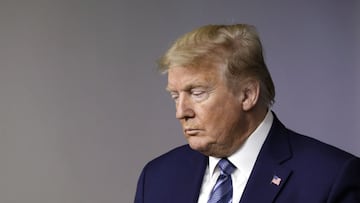Trump's impeachment: verdict acquitted
Donald Trump’s second impeachment trial has now concluded in the Senate, with the prosecution and defence agreeing to forego witnesses. What was the outcome?

Donald Trump’s impeachment trial, being held in the Senate begun on Tuesday and has now concluded. Saturday the trial resumed with debates on whether to call witnesses and the start of closing arguments on both sides, followed by the all important vote on whether to convict or acquit.
What was the verdict?
On Saturday, the Senate voted 57-43 to acquit the former president, a second time. Seven Republican senators joined all 50 Democrats to convict.
Trump survives his second impeachment trial as senators decide not to convict him for inciting a riot at the US Capitolhttps://t.co/ek0281pE9j
— CNN Breaking News (@cnnbrk) February 13, 2021
The jury consisted of all 100 current US senators of the 117th Congress.
In his first impeachment trial in February 2020 the Senate voted largely along party lines; The votes were 52–48 to acquit on the first count (abuse of power) and 53–47 to acquit on the second count (obstruction of Congress). There were 47 Democratic senators and 53 Republicans at the time. Mitt Romney became the first senator in history from an impeached president's party to vote to convict, voting "guilty" on the first count.
It played out slightly differently this time, but ultimately made no difference. The split in the Senate between parties is exactly 50-50. To convict in an impeachment trial, a two-thirds majority is required, which means that at least 17 Republican senators would have had to join all Democrats in voting to convict.
On Tuesday, only six Republicans joined all Democrats in voting that the trial should continue, against the defence’s argument that the trial itself was unconstitutional, as impeachment power should not be used against an ex-president.
The six Republican senators who voted that the trial is constitutional,were: Bill Cassidy of Louisiana, Susan Collins of Maine, Lisa Murkowski of Alaska, Mitt Romney of Utah, Ben Sasse of Nebraska and Patrick J. Toomey of Pennsylvania.
On Thursday, the Hill reported that Senate Republicans were complimentary when asked about the presentation from House impeachment managers, but suggested that it wouldn't ultimately change the outcome of the trial.
"I think they did a good job. I don't believe the facts are largely in dispute about what happened that day or the nature of what happened,” said Sen. Marco Rubio (R-Fla.).
“The fundamental question for me, and I don't know about everybody else, is whether an impeachment trial is appropriate for someone who is no longer in office. I don't believe that it is. I believe it sets a very dangerous precedent,” Rubio added.
In the vote in the House of Representatives on 13 January, lawmakers votes 232 to 197 to impeach Donald Trump, also largely along party lines but with 10 Republican representatives voting against Trump.
With Trump acquitted, why is it important?
Vox argues that in failing to acquit Donald Trump in even the most extreme case of insurrection against the US government, the Senate will be serving a necessary function to start to fix a broken democratic system.
The acquittal would show that the country’s political system is incapable of holding elites accountable largely due to one party’s extreme partisanship. “Demonstrating this will serve as a justification for people, Democrats and civil society alike, to take more dramatic steps to repair American democracy down the line — including pushing for significant reforms of the political system.” Reported the paper.
What happened with calling witnesses to trial?
Some Democrats are keen to call witnesses in order to thoroughly investigate the events of the Capitol riot on 6 January, whereas others are keen to move quickly beyond that, in order to allow the Senate to begin with the business of confirming Biden’s cabinet nominees and debating spending legislation. Calling witnesses could have delayed the process by weeks or even months, say USA Today.
There was some back and forth on the issue Saturday. According to CNN, the Senate initially voted to call witnesses but in a U-turn later that day, after hours of discussions, they instead agreed to admit a witness statement into evidence.
House managers have asked to call witnesses after new details emerged about House Minority Leader Kevin McCarthy's call with former President Trump on the day of the Capitol riot in which Trump refused to call off rioters.
What was Trump being impeached for?
Related stories
In the US Constitution, impeachment is appropriate when a President or other federal official has committed one of the violations described as “treason, bribery, or other high crimes and misdemeanors.” It allows a President to be removed from office; and after the trial the Senate could subsequently vote to disqualify Trump from ever holding federal office again.
The article of impeachment drawn up by Democrats the very night of 6 January, when an insurrection on the Capitol complex endangered hundreds and killed five is brief. It charged Trump with threatening “the integrity of the democratic system”, interfering “with the peaceful transition of power”, and imperilling “a coequal branch of Government.”
